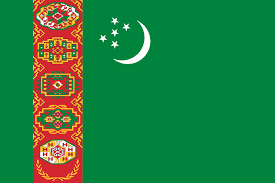Language/Turkmen/Grammar/Adjective-Agreement
Welcome to this lesson on adjective agreement in Turkmen! In this lesson, we will learn how to make adjectives agree with the nouns they modify. Adjective agreement is essential for clear communication in Turkmen, as it helps to provide a more specific meaning to the noun being described. We will also introduce some cultural information and interesting facts about the Turkmen language and culture throughout the lesson.
Introduction to Adjective Agreement
In Turkmen, adjectives always agree with the nouns they modify in two ways: gender and number. This means that the form of the adjective must match the gender (masculine or feminine) and the number (singular or plural) of the noun it is describing. Unlike some other languages, Turkmen does not have a case system for its adjectives, which makes learning adjective agreement a bit easier for learners.
Let's start by looking at some examples of adjective agreement in Turkmen:
Examples:
| Turkmen | Pronunciation | English |
|---|---|---|
| köne şäher | kuh-ne shah-her | old city (masculine) |
| köne masgala | kuh-ne mas-ga-la | old market (feminine) |
| uly jay | oo-ly jai | big house (masculine) |
| uly maşyn | oo-ly ma-shin | big car (feminine) |
In the examples above, you can see that the adjectives "köne" (old) and "uly" (big) agree with the nouns they modify in terms of gender. Now let's see how this agreement applies to plural nouns.
Examples:
| Turkmen | Pronunciation | English |
|---|---|---|
| köne şäherler | kuh-ne shah-her-ler | old cities (masculine, plural) |
| köne masgalalar | kuh-ne mas-ga-la-lar | old markets (feminine, plural) |
| uly jaylar | oo-ly jai-lar | big houses (masculine, plural) |
| uly maşynlar | oo-ly ma-shin-lar | big cars (feminine, plural) |
As you can see, the adjectives agree with plural nouns as well. Notice that the plural noun endings (-ler for masculine and -lar for feminine) are added to the base form of the noun, and the adjectives remain in the same form as with the singular.
Forming Adjective Agreement
To make adjectives agree with nouns in Turkmen, we generally follow these steps:
1. Identify the gender of the noun (masculine or feminine). 2. Identify the number of the noun (singular or plural). 3. Modify the adjective to match the gender and number of the noun (if necessary).
Remember that Turkmen adjectives do not change their form for gender, which makes it easier for learners. Most adjectives will remain unchanged, while some may have slight spelling adjustments for pronunciation purposes. Let's look at some more examples to illustrate the process:
Examples:
| Turkmen | Pronunciation | English |
|---|---|---|
| ak ýol | ak yol | white road (masculine) |
| ak satlyk | ak sat-lyk | white sale item (feminine) |
| ak ýollar | ak yol-lar | white roads (masculine, plural) |
| ak satlyklar | ak sat-lyk-lar | white sale items (feminine, plural) |
In the example above, the adjective "ak" (white) remains the same for both gender and number.
Cultural Information: Turkmen Adjectives and Proverbs
Turkmen language and culture are rich in proverbs and sayings. Many of these proverbs contain adjectives that are used as descriptors to convey deeper meanings and life lessons. Here are some examples of Turkmen proverbs that involve adjectives:
- "Gökden uzak ýer ýok" (“There is no place far from the sky”) – This proverb reminds us that even though some places may seem distant, we are all connected under the same sky.
- "Gara gün gara ejesinden ýorar" (“A black day descends from its black mother”) – This proverb emphasizes that unpleasant events often have their origins in past events or circumstances.
- "Mollalaryň biri yşysa, özüni has agtyr" (“If all the wise men weep, the weeper will think he is wiser”) – This proverb highlights the importance of humility and recognizing our own limitations in the face of the wisdom of others.
Notice how the adjectives in these proverbs, such as "gökden" (from the sky), "gara gün" (black day), and "has agtyr" (wiser), help to create vibrant and memorable imagery.
Practice: Creating Adjective Agreement in Turkmen
Now it's your turn to practice creating adjective agreement in Turkmen! Use the following nouns and adjectives to create phrases that demonstrate proper agreement:
- Noun 1: atas (father, masculine)
- Noun 2: eje (mother, feminine)
- Adjective 1: iýmitli (kind)
- Adjective 2: taýdan (experienced)
Write sentences using each noun with both adjectives, and then make the phrases plural:
Examples:
| Turkmen | Pronunciation | English |
|---|---|---|
| iýmitli atas | i-y-mit-li a-tas | kind father |
| taýdan eje | tay-dan e-je | experienced mother |
| iýmitli atalar | i-y-mit-li a-ta-lar | kind fathers |
| taýdan ejeler | tay-dan e-je-ler | experienced mothers |
Now try forming your sentences using the Turkmen words and following the steps for agreement that we discussed earlier in the lesson. And don't forget to practice saying them aloud to help improve your pronunciation!
Recap and Conclusion
In this lesson, we learned about adjective agreement in Turkmen, which is related to the gender (masculine or feminine) and the number (singular or plural) of the noun being modified. We discussed the process for forming agreement and looked at various examples using different adjectives. Additionally, we talked about some cultural aspects of Turkmen language, particularly proverbs involving adjectives. Finally, we practiced creating agreement with a set of nouns and adjectives.
By understanding and applying adjective agreement in Turkmen, we can convey more precise meanings and create clearer communication. Keep practicing and using what you've learned in this lesson as you continue advancing in your Complete A1 Turkmen Course.
{{#seo: |title=Adjective Agreement in Turkmen: A Complete Guide |keywords=Turkmen language, adjective agreement, Turkmen culture, Turkmen proverbs, learn Turkmen |description=Learn how to make adjectives agree with nouns in Turkmen by understanding gender and number agreement. Discover cultural insights and practice your skills.

